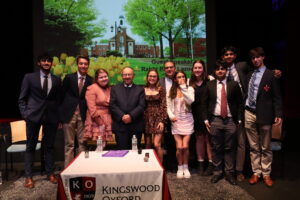April 03, 2023
Holocaust Survivor, Rabbi Lazowski, speaks at Kingswood Oxford Assembly
To hear a firsthand account of one of the last remaining Holocaust survivors is a deeply profound experience. On Friday, April 1, Rabbi Philip Lazowski spoke to KO students about his survival during the Holocaust in Russia and the incredible strength of the human spirit. In a time of increasing anti-Semitism and other hate crimes in the U.S., Lazowski exhorted us to actively speak out against hate and oppression in all its forms.
“Life has become increasingly incomprehensible with an arsenal of weapons and destruction,” he said. “Mankind is divided. Hate is on the rise. Human life can be poisoned through the indoctrination of hate. That is what we are facing.”
Lazowski was born in 1930 in the small town of Bielica (present-day Belarus). When the Germans invaded Russia in June of 1941, German forces marched into his hometown and began mass exterminating the Jewish population. The quick-witted 11-year-old helped hide his family in a cave he had built under their home. However, returning to their hideout one day, a German soldier caught Lazowski and forced him to the marketplace, where a selection was taking place. Separated from his family, he asked several women if he could pretend to be their son. One woman with two young daughters took him as her son, and he was able to return to his family’s hideout.
After being discovered in their underground cave, Lazowski and his family were forced into a theater in their town where they heard the soldiers coming. Lazowski said, “Hearing the trucks meant another massacre.” Knowing they would likely be killed, his mother told him to jump out a second-story window to give her son a chance at survival. He somberly recounts telling her “no” and pleading with her to jump. At the time, she was holding his younger siblings and, therefore, could not jump herself. Taking a chair, she broke a window and pushed him out, where he fell, next to another young boy, and together they escaped. She and his three younger siblings would not survive the Holocaust, but Lazowski, his younger brother, and father would, hiding out in the woods for two years before eventually making their way to the United States.
Approximately 85% of those that lived in the woods perished from cold temperatures, sickness, and the ever-present danger of being caught by Nazis. A fisherman by trade, Lazowski’s father had a handful of Christian friends who would give the three bread and potatoes to help keep the family alive. “No matter how dangerous it was for them, they would help us in many ways,” said Lazowski. “Otherwise, we would not have been able to survive.”
After escaping the Nazis and fleeing to the United States in 1947, he continued his education at Brooklyn College. While attending a friend’s wedding, he met a young woman who told him about a family in Hartford, Connecticut, that had once saved a boy from Bielica. Lazowski knew he was that boy.
In a true Hollywood exquisite twist of fate, Lazowski found out where they lived and was reunited with the woman, Miriam, who had saved his life in the marketplace that day so many years ago. They met for coffee, and he began dating her oldest daughter, Ruth, eventually marrying her.
Following Lazowski’s talk, he fielded questions from the students. Many of their questions stemmed from the incredulous nature of how he could continue and find the will to live, despite what seemed like an inevitably bleak future. The rabbi was poignant and thoughtful in his answers, and his voice tinged with a Slavic accent, pausing almost as if to pick the exact words to describe the heavy burden he felt was his calling and responsibility to explain.
One student asked if he wanted to forget his torment as a youngster. Rabbi said that many survivors do not share their stories with their friends and loved ones because it is too painful to open up. For Rabbi Lazowski sharing his story is a moral imperative.
“It’s part of your history, and you never forget what kind of pain you went through to survive. It’s very easy to forget. Certain things we have to forget. Certain things we have to remember. To remember what you went through is a must. I can never forget what I went through. Each and every survivor has his own story. To me, I thank God I was able to tell the story for others to know.”
Another student asked Lazowki how he found his purpose and persevered during his ordeal.
“In order to persevere, I always listened to my mother’s teaching,” he said. She taught me three things. First to survive. To survive is not easy. You have to have stamina and willpower. Second, she told me to be somebody – not to have money – but to learn and to study; that’s how you become somebody. You need the courage and determination to have the faith to keep going, to be determined and not wishy-washy. And lastly, she told me to be a good human being and be good to others. You must try in every way you can. We must try our very best to be good human beings. You have to act right, feel right, and do right.
The rabbi’s comments and harrowing account should remind us of who we are and who we can be collectively – that justice and righteousness need to form our moral center.
